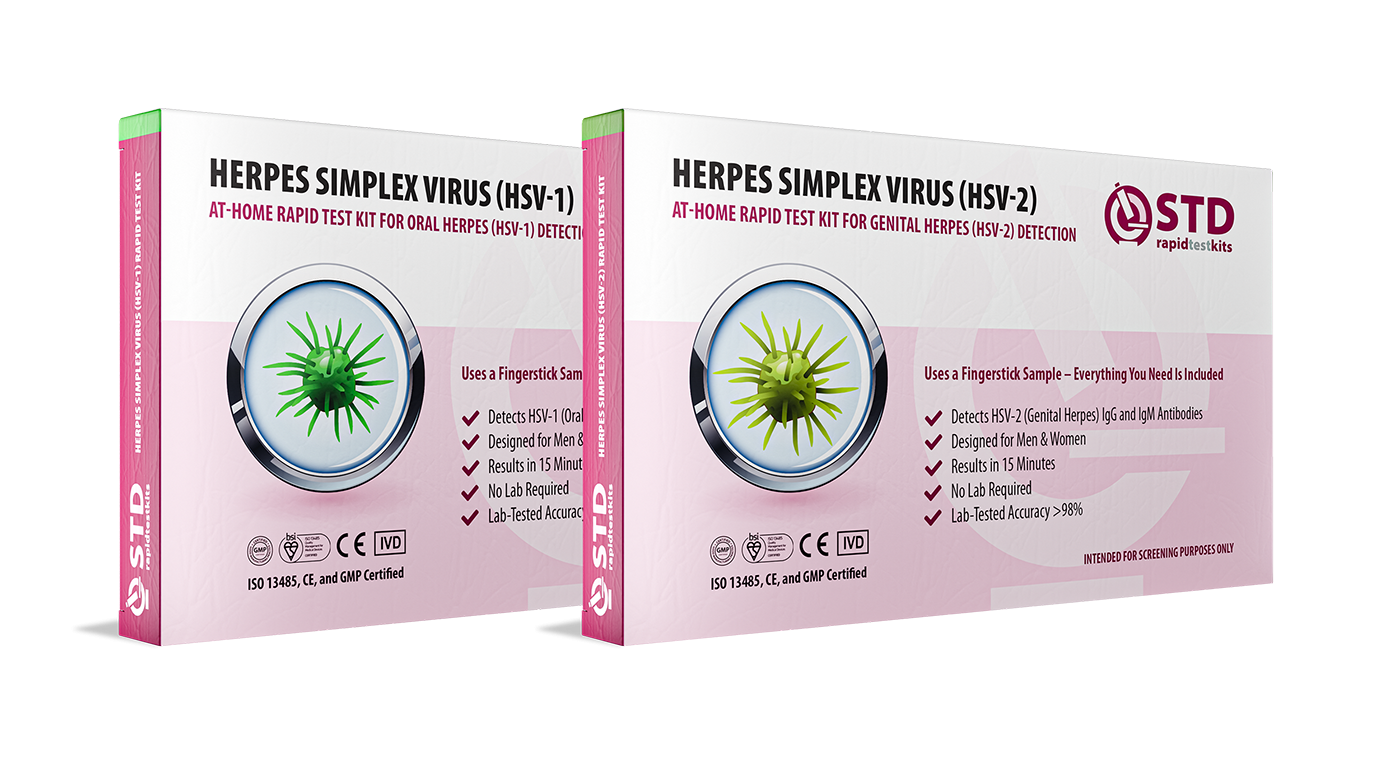Herpes and Hookups: Your Guide to Safe, Sexy, and Honest Connections
Let's Get Real
Let’s be real: hearing the word “Herpes” in a doctor’s office feels like getting slapped by stigma. Your mind races. Will I ever have sex again? Will anyone want me? Can I even date? But here’s what the panicked Googling doesn’t tell you: millions of people date, hook up, fall in love, and build lasting relationships with herpes. You’re not broken. You’re not alone. And yes, you’re still hot and desirable.
Globally, over 3.7 billion people under age 50 have HSV-1, and around 500 million live with HSV-2, and many don’t even know it. That’s not a cautionary tale. That’s context. This isn’t rare, it’s just rarely talked about out loud. And that silence? That’s what we’re breaking here.
Key Benefits of Owning Your Status
Here’s the twist: once you start dating with herpes, something shifts. You start having the kind of conversations most people avoid. You develop sharper radar for emotional maturity. You weed out performative allies from real ones. And in a strange, empowering way, you start choosing better partners.
- Clarity: Disclosing your status forces honesty early on. It’s a shortcut to real talk.
- Confidence: Learning to own your diagnosis can boost your self-worth, not shrink it.
- Filtering Out Nonsense: If someone ghosts after disclosure, thank them for showing you early.
Herpes doesn’t make you less. It makes you more intentional. And that can be a superpower in the mess of modern dating.

People are also reading: Why STDs Are Spreading Like Wildfire in 2025
The Hardest Parts (And How to Face Them)
Let’s not sugarcoat it. Dating with herpes comes with emotional landmines. You might delay disclosure until you're already invested. You may fear rejection or be haunted by one. You could even find yourself questioning your worth entirely. That’s normal. And it’s survivable.
Some of the most common challenges include:
- Disclosure Anxiety: When do you tell? What do you say? Will they freak out? (Spoiler: most don’t.)
- Stigma Fatigue: Tired of being treated like a walking cautionary tale? Yeah, us too.
- Ghosting or Rejection: Not everyone will handle your honesty with grace. But that's not about you.
Here’s the deal: rejection happens to everyone. But when it happens after you disclose, it can feel sharper. Still, most people respond with curiosity, kindness, or at least, decency. And those who don't? They're doing you a favor.
Check Your STD Status in Minutes
Test at Home with RemediumGenital & Oral Herpes Test Kit

 For Men & Women
For Men & Women Results in Minutes
Results in Minutes No Lab Needed
No Lab Needed Private & Discreet
Private & DiscreetOrder Now $75.00 $98.00
For all 2 tests
Solutions That Actually Work
If you’re navigating post-diagnosis dating, you don’t need fluff. You need strategy. Here’s what actually helps:
- Practice Your Disclosure Script: Rehearse it. Make it your own. Keep it factual, and add heart if you want.
- Lead with Confidence: Frame it as something manageable, not a shameful confession.
- Use Protection & Suppression: Daily antivirals and condoms reduce transmission risk dramatically.
- Join Supportive Communities: Online groups and dating apps like Positive Singles can remind you you’re far from alone.
And above all, get tested regularly. If you're dating and sexually active, that goes for everyone.
Statistical Insights and Data
If you’re dating with herpes, here’s your reminder that you are not a rare case, you’re statistically normal. According to the World Health Organization, over two-thirds of the global population under 50 has HSV-1, and about 13% carry HSV-2. In the U.S. alone, it’s estimated that 1 in 6 adults have genital herpes, and most don’t even know it.
That means every time you match with someone on an app or flirt across a bar, odds are decent they either have herpes, have been exposed to it, or know someone who has. The real epidemic? Ignorance and silence, not the virus itself.
Transmission rates drop drastically with consistent antiviral treatment (like valacyclovir) and condom use. A study in the *New England Journal of Medicine* showed a 48% reduction in transmission risk with daily suppression. That’s not just reassuring, it’s empowering.

People are also looking for: Are there STDs that antibiotics don’t cure?
Expert Opinions and Case Studies
Dr. Ina Rosenberg, an infectious disease specialist at Columbia University, puts it plainly:
“We’ve done a disservice by letting stigma grow around a virus that’s more nuisance than threat. It’s manageable. And it doesn’t make someone unlovable.”
Take “Alyssa”, 29, diagnosed with HSV-2 after a college fling.
“I thought no one would ever want me again,” she said. “But once I started talking about it like it was no big deal, people followed my lead. My current partner actually thanked me for being honest. We’ve been together three years.”
“Jeremiah”, a 41-year-old gay man in Los Angeles, uses herpes as his litmus test:
“If a date can’t handle a convo about sexual health, we’re not vibing anyway. Herpes just speeds up the vetting process.”
Real talk from real people. And those voices matter just as much as the science.
Historical Context: Where Did All This Stigma Come From?
Believe it or not, herpes wasn’t always such a cultural monster. Before the 1980s, it was often described in medical literature as a “minor skin condition.” But when pharmaceutical companies developed antiviral meds like acyclovir, the marketing machine kicked in. Cue fear-based ads, tabloid headlines, and decades of silence and shame.
The virus didn’t get scarier. The narrative did. What we’re dealing with isn’t just an infection, it’s a PR problem.
Sexual health experts now agree: the stigma around herpes is wildly out of proportion to its medical reality. It doesn’t affect fertility. It’s rarely dangerous. And it’s extremely common. But unlearning decades of fear? That takes time, and voices like yours.
Future Trends in Herpes Treatment and Dating Culture
The good news? The herpes narrative is shifting. Younger generations are more open about STDs and mental health, and dating platforms like Hinge and Tinder are seeing increased conversations around STI transparency. Apps like Positive Singles and MPWH (Meet People with Herpes) are carving out space for stigma-free connection.
Meanwhile, biotech companies are pushing forward with HSV vaccine research. Several candidates are in Phase II trials, including therapeutic vaccines aimed at reducing outbreaks and shedding. The future might not just be about managing herpes, it could be about erasing it altogether.
Until then, we manage it. We talk about it. And we love boldly anyway.
Check Your STD Status in Minutes
Test at Home with Remedium7-in-1 STD Test Kit

 For Men & Women
For Men & Women Results in Minutes
Results in Minutes No Lab Needed
No Lab Needed Private & Discreet
Private & DiscreetOrder Now $129.00 $343.00
For all 7 tests
Practical Applications: What This Looks Like IRL
So how does dating with herpes actually play out? Often, it's way less dramatic than you think. Here's how it tends to unfold:
- First Dates: You don’t need to disclose right away. Wait until trust builds, before sex, always.
- Disclosure Moments: Be calm, clear, and confident. Expect questions. Welcome them.
- Dealing with Reactions: Most people say some version of “Thanks for telling me.” A few may need time. A few may opt out. All responses are information.
- Post-Rejection Recovery: Feel the sting, but don’t stay in it. They rejected a situation, not you
- Common Misconceptions About Dating with Herpes
FAQs
1. Can I date someone who doesn’t have herpes?
Yes. Many couples navigate herpes together with honesty, protection, and antiviral meds. It’s totally possible.
2. Do I have to tell my partner if I have herpes?
Yes, ethically and often legally. Informed consent is essential before any sexual contact.
3. Will I ever have a normal sex life again?
Absolutely. You might even find it's more intimate, honest, and connected than before.
4. When should I disclose my herpes status?
Before sexual activity, ideally when trust and emotional safety have developed but before getting physical.
5. How do most people react to herpes disclosure?
Surprisingly well. Rejection happens, but many respond with respect and curiosity.
6. Can herpes be cured?
No, but it can be effectively managed. Antiviral meds reduce symptoms and transmission risk.
7. Is oral sex safe if I have HSV?
It can transmit HSV-1 or HSV-2. Barriers like condoms or dental dams and suppressive therapy help reduce risk.
8. Can I use dating apps if I have herpes?
Yes, and many people do. You can disclose in your profile or wait until a connection forms.
9. How do I know if I have herpes?
Get tested. Some people show symptoms like blisters or tingling; others don’t. Try an at-home Herpes Home Test Kit for privacy and peace of mind.
10. Can herpes affect fertility or pregnancy?
Not usually, but pregnant people with HSV should talk to their doctor to manage risk of neonatal transmission.
Take Back the Power!
If you’ve just been diagnosed, or if you’ve been carrying this quietly for years, know this: your love life isn’t over, it’s evolving. Herpes isn’t your weakness. It’s your filter, your honesty check, and weirdly enough, your intimacy upgrade. You deserve real love, real pleasure, and real connection, and you can have all of that and more. Start by getting informed, getting tested, and taking back the narrative. Your story isn’t about shame. It’s about strength.
Sources
1. Risk determinants of sexual behaviors: Dating apps may increase STI risk – PMC
2. Dating app use linked to more unprotected sex and higher STI risk in college students – News-Medical
4. Mathematical model of dating apps' influence on STD spread – Springer
5. Active dating app users report more risky behavior and STI diagnoses than non-users – ScienceDirect
6. How hookup culture and dating apps have shaped increased STD risk – Hope Across The Globe










